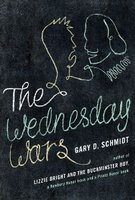
I had the good luck to read The Wednesday Wars by Gary D. Schmidt just before the ALA announced it had been named one of this year's honor books. I wasn't surprised. The Wednesday Wars is adored on my listservs and there was Newbery talk regarding it way back in April.
Personally, I didn't think there was a whole lot of story to Wednesday Wars. It's more just charming episodes from the life of seventh grader Holling Hoodhood. I think the title "Wednesday Wars" refers to conflict between Holling and his teacher who are alone together every Wednesday afternoon when, back in 1968 when our story takes place, all the Jewish and Catholic kids (Holling is neither) in the classroom are released early from school to attend religious classes. However, this aspect of the plot is dropped pretty early on. His teacher, Mrs. Baker, remains an imposing character, but after the first few chapters Holling no longer talks of her hating him. We get a lot of history lessons by way of Holling's family who represent, in rather superficial ways, various aspects of 1960's life. His sister is a big Bobby Kennedy fan. (I wondered how many kids would know who Bobby Kennedy was.) Dad is a conservative supporter of the Vietnam War. Mom desperately needs to read The Feminine Mystique.
But while I found the book only so-so, I understand that Newbery books tend to be books (other) adults like. I'm okay with that. I can see what those other adult readers found so very attractive about The Wednesday Wars. Holling and his teacher end up (probably? improbably?) reading Shakespeare together and that gives the book a very literary tone. The book is also improving. In addition to the instruction relating to literature, readers also get lessons on tolerance and, to a lesser extent, good parenting.
Many adults in kidlit do believe children's books should be instructive, and this is an attitude toward literature for the young that goes back for generations, if not centuries, according to my sources on my listservs. While overt lessons are not something I look for in any of my reading, I understand that the adults in kidlit who do want it have tradition to justify their position.
For all the flaws I find in The Wednesday Wars, it may be a Newbery book that child readers can actually enjoy. Some kids may find the 1960's world portrayed here far less disturbing than the one they live in in the twenty-first century. The bad dad in The Wednesday Wars is merely narrow-minded, demanding, and focused on his work rather than his family. He's absolutely quaint compared to the bad dads we see in the news now who molest and murder their children. The bully in Wednesday Wars is kind of sweet. He just roughs up kids on the playground or on their way home. No knives are pulled. No one is beaten to death just for the hell of it. He is a traditional, card-carrying bully, who we know isn't going far in life. He's not a kid from the top of the social hierarchy taking pleasure in tormenting those less fortunate than himself.
I really don't care about using literature as a pulpit. But if some young readers can find escape in The Wednesday Wars, I'm all for it.
2 comments:
Hi Gail,
You might be interested to know that my library's Mock Newbery club picked the Wednesday Wars early on for a Newbery winner and chose it as an honor book. Our Mock Newbery is for children ages 11-14. They seemed to enjoy it. There was something refreshingly innocent about that book.
That seemed to be the response from a lot of the adult readers at the listservs, too. I think the innocence/a-simpler-time thing was a big draw for them.
Post a Comment